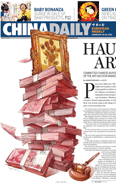Technology
Wii rocked by corp's Xbox factor
Updated: 2011-02-14 11:11
By Chen Limin (China Daily)
Takashi Sensui, general manager of Microsoft Corp's home and entertainment division, hands a Kinect for Xbox 360 to a customer at an electronics chain in Tokyo. Sales of the online gaming product have proved to be very successful in Asia. [Photo / Provided to China Daily]
Microsoft's Kinect knocks Japanese rival as sales enter upward drive

BEIJING - Sales of Microsoft Corp's Xbox 360 have been overtaking Nintendo Co's popular Wii in Beijing's games console market, mainly boosted by its motion-sensing Kinect controller.
Kinect, launched on Nov 4 as an add-on for Microsoft's Xbox 360 console, has seen its sales on the rise after it hit the gray market in China two weeks after its official launch.
"When Kinect arrived in November, few customers asked about Wii or Sony's PlayStation 3," said Zhuang Xiaoxiang, a seller at a game console shop in the Gulou area of Beijing, a major market for such products.
He said that the shop had a recent record of selling as many as seven Xbox Kinect bundles, priced at 2,650 yuan ($402) each, and three Kinect devices at 1,250 yuan, a day.
Zhao Chungu, a game console shop owner in Gulou, said the situation in his shop was similar.
He sold about 130 Kinect devices through his online shop in two months and the number of Kinect sold in his Gulou shop is "even more".
Kinect, which enables players to control games through the movement of their bodies with motion-detecting cameras and microphones, is Microsoft's latest effort to make more money from the game console market and extend the product life of its Xbox 360 console.
Kinect sensors
Microsoft said last month that it shipped more than 8 million Kinect sensors, which exceeded its forecast. The company, like others, however, didn't officially release its game consoles or other accessories in China as the government bans import of this kind.
But two months after Kinect appeared in the gray market, sellers said that Microsoft was not the only winner with Sony's PlayStation 3 catching up after Kinect's November debut.
"The new version of the Xbox 360 is not 'jailbroken' yet, so many customers turned back to PlayStation 3 even though they are interested in Xbox 360 and Kinect," said Zhuang.
"There will inevitably be a rise in customers after the device is jailbroken," said Xu Dong, a seller at game console chain store TGBus in Beijing's largest electronics trading market, Zhongguancun.
| ||||
They used to be the shop's bestseller but have been recently overtaken by Xbox and PlayStation 3.
Nintendo's Wii enjoyed worldwide success after it was launched in 2006 with its pioneering motion-sensitive controller. Microsoft and Sony adopted similar approaches with the release of PlayStation Move and Xbox 360's Kinect last year.
According to research company International Data Corporation, China's handheld and video game console market is expected to be worth $350 million by 2011 with a shipment of 3.6 million, increasing at a compound annual growth rate of 9.8 percent. That is a rise in sales of 19.6 percent compared with 2006.
"Microsoft is in talks with the Chinese government over Xbox and Kinect's official entry to the country and we hope the devices can come to China as soon as possible," said Zeng Liang, vice-president of Microsoft's Greater China.
Nintendo sold 3.57 million Wii consoles in the United States in November and December, while Microsoft sold 3.27 million Xbox consoles over the same period because of short supply of the product, the two companies said, citing figures from researcher NPD Group Inc.
E-paper

Online shops boom in China
Low investment, quick returns offer profit-making opportunities for struggling students.
Something 'fishy' about this trick
Banking on success
Branded outlets move in
Specials

The green lantern
Environmental concerns are shedding new light on a colorful tradition

Inland interchange
Chongqing bets on its position as a hub for China's west.

Zooming in on Chinese skies
Helicopter companies ride on country's growing interest in luxury aviation.




